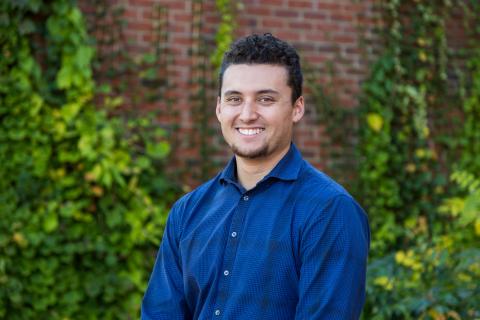Kelvin Cochrane ’22: Sharing Lessons in History and Humanity
Kelvin Cochrane ’22 was a history buff as a child, piqued by stories his maternal grandmother shared about her World War II experience as a Japanese Canadian woman. Cochrane would later recount her life to audiences at Plymouth State, where he was honored as his class year’s distinguished history graduate, and they also inspired his path to graduate school.
Cochrane grew up skiing in Calgary and followed several friends who skied for Plymouth State to campus, where he excelled in the classroom and built relationships with students and professors alike. “I got a lot out of the University,” he says. “It was the best four years of my life. I found everyone to be friendly and welcoming and the smaller class sizes were extremely valuable as well. I was on a first-name basis with most of my professors.”

Cochrane welcomed first-year students to PSU as a global engagement ambassador because he so appreciated his own introduction to campus. He was a member of both the University’s Honor Society and the National History Honor Society and completed an internship at the New England Ski Museum in his senior year, analyzing films of ski and race instruction from the 1930s to the present.
“Plymouth gave me confidence,” says Cochrane, noting the “soft skills” he learned from skiing—such as time management and prioritizing—have helped him in life as well.
Cochrane used his grandmother’s diaries from the war to build his senior capstone project presentation. He explained that Yoshino Okabe, his “gramma,” grew up in the small town of Mission, British Columbia, on her family’s successful berry farm. In 1942, some months after Japan’s surprise attack on Pearl Harbor, the Royal Canadian Mounted Police gave Okabe, then only 17, and her family 24 hours to vacate their home before sending her and her parents to southern Alberta by train. They also shot the family dog.
“She thought getting on the train was the start of a vacation,” explains Cochrane, “She had no idea she would never see her home again.”
Seven years later, though, when her family was allowed to return home, the Canadian government had sold their five-bedroom farmhouse and all the acreage. Cochrane concluded that Japanese families in Canadian provinces were interned in camps not because of the stated fear that they aligned with the Japanese Empire, but instead because Caucasians saw the Japanese as an economic threat. He believes fear and racism played a part in the exodus.
After graduation, Cochrane returned to Canada and coached ski racing in Banff for a year and later worked at a gas compression company, helping millwrights and welders build compression stations. He had been thinking about graduate school and secured a scholarship from the Japanese Canadian Legacies Society after his grandmother saw a newspaper ad for the fund. He met the qualifications, which included being of Japanese descent and having a survivor in the family line.
The one-year master’s program in public policy at the University of Calgary offers a mix of politics, government, and economics. Cochrane hopes to use his degree as an intermediary between the government and private corporations that fuel Alberta’s oil and gas industry. He says, “I want to work in the private sector to help build Alberta’s economic output, pushing policies forward that would benefit the companies.”
His grandmother is 98 now, and while she still shares stories from the war and talks about how difficult a time it was, she feels no resentment toward the Canadian government. Only forgiveness.
Cochrane loves telling his grandmother’s story, for the lessons it offers in history—and humanity.

